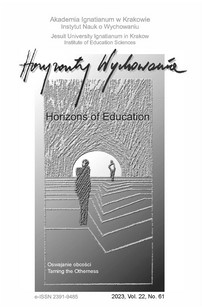Emotions Experienced by English Teachers While Taming the Unknown (Distance Learning) During the COVID‑19 Pandemic
Emotions Experienced by English Teachers While Taming the Unknown (Distance Learning) During the COVID‑19 Pandemic
Author(s): Marzena Wysocka-NarewskaSubject(s): School education, Educational Psychology, Health and medicine and law, Distance learning / e-learning, Pedagogy
Published by: Uniwersytet Ignatianum w Krakowie
Keywords: emotions; distance learning; teachers; covid‑19; teacher of English;
Summary/Abstract: RESEARCH OBJECTIVE: The aim of the current study was to investigate emotions accompanying teachers in the process of getting accustomed to the new situation of distance learning during the COVID-19 lockdown in secondary schools in Poland. THE RESEARCH PROBLEM AND METHODS: The research questions concerned the type of emotions teachers experienced, the triggers provoking most positive and negative emotions, as well as factors influencing teachers’ emotional states. The tool used in the study was the questionnaire by means of which the teachers were to identify emotions they had towards people who took part in the lesson, the lesson itself, the equipment used and other interrelated issues in line with Yik’s circular model of affect. THE PROCESS OF ARGUMENTATION: Distance learning causes many different emotions. The way teachers reach students remotely, often unfamiliar and unknown to many of the educators, has been further complicated by the COVID-19 pandemic. In addition to fulfilling their teaching duties, the teachers had to face extra-curricular difficulties and dangers, such as infection, isolation and quarantine, and gradually get used to the new situation. RESEARCH RESULTS: The obtained results indicate emotional changes at each stage of getting accustomed to the new situation. The tendencies observed could be described as increasing negative feelings experienced by the sample at the very beginning of distant education that lowered towards the end of the school closure periods, and/or were replaced with positive ones. CONCLUSIONS, INNOVATIONS, RECOMMENDATIONS: The author presents measures to be used to improve the school situation, among which an immediate solution lies in the courses currently offered by many institutions, and IT support offered by schools. Also, ideas on how to expand the current study, involving those allowing for a comparison between different levels of education and among other participants of distance learning, such as primary/university teachers as well as learners and their parents and siblings.
Journal: Horyzonty Wychowania
- Issue Year: 22/2023
- Issue No: 61
- Page Range: 79-92
- Page Count: 14
- Language: English

